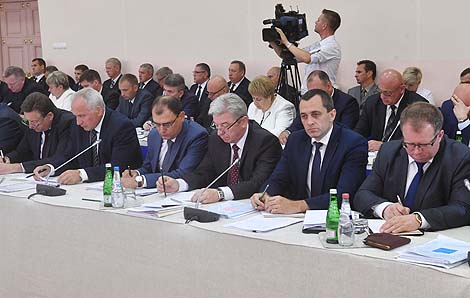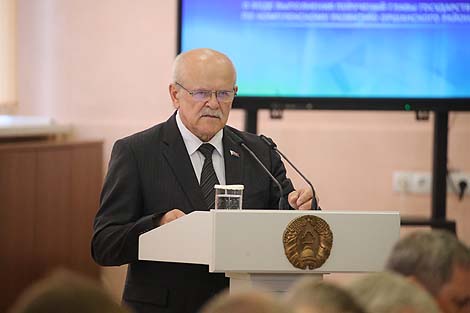Opinions & Interviews
Belarus president points to systemic shortcomings in Orsha District development

ORSHA, 14 August (BelTA) – Belarus President Alexander Lukashenko mentioned systemic shortcomings in the comprehensive development of Orsha District at a session held on 14 August, BelTA informs.
According to the head of state, the social sector in Orsha has been improved. The city has been landscaped and should be further kept in proper condition. “This, however, needs a manufacturing base. People need to work, raise children and support their families,” he said.
 According to Alexander Lukashenko, the main emphasis was made on the industrial base, the products which are in demand in the country. “I have made decisions in respect to all the areas. They have been systematized and put across to the performers. Almost nothing has been done though, despite my instructions and warnings at the highest levels, starting from my address to the nation and the parliament,” the Belarusian leader said.
According to Alexander Lukashenko, the main emphasis was made on the industrial base, the products which are in demand in the country. “I have made decisions in respect to all the areas. They have been systematized and put across to the performers. Almost nothing has been done though, despite my instructions and warnings at the highest levels, starting from my address to the nation and the parliament,” the Belarusian leader said.
The president cited an example of the efforts made to boost flax industry. The instructions included those related to flax cultivation, the production of linen fabrics and clothes. “Now it is a well-developed system. The same was done in respect to the development of the town of Baran, the town of Bolbasovo, and the city of Orsha,” Alexander Lukashenko said.
 Chairman of the State Control Committee Leonid Anfimov reported on major shortcomings during the session. In his words, the strategic goal set by the head of state, which was to significantly improve the situation in Orsha as early as in 2017 and ensure the economic development of the district, has not been achieved. In general, the results are extremely unsatisfactory.
Chairman of the State Control Committee Leonid Anfimov reported on major shortcomings during the session. In his words, the strategic goal set by the head of state, which was to significantly improve the situation in Orsha as early as in 2017 and ensure the economic development of the district, has not been achieved. In general, the results are extremely unsatisfactory.
Some indicators in Orsha District, despite the existing potential, are below the average in the oblast, including the index of industrial production, exports of goods and other sectors. The undertaken measures have been insufficient to draw unused facilities and land plots into economic circulation. Enterprises face many problems. The main socio and economic issues related to employment and salaries have not been addressed.
Leonid Anfimov added that even the events that do not require big material and financial investment, such as cleaning up the territories of enterprises, have not been fulfilled. The work cannot be called systemic, and its current state is largely cosmetic.







 print version
print version make home page
make home page add to bookmarks
add to bookmarks

